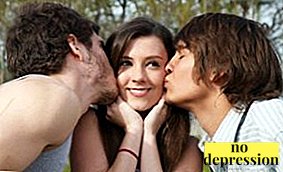Neurasthenia significantly worsens the standard of living not only the patient, but his entourage.
It is difficult to feel happy when your body or the health of a person close to you is “tormented by fire” from the inside, unjustified hatred of all living things, guilty of what simply exists in the world.
General information about the disease

So called common type of mental disorder because of which a person is constantly in an irritated state, unable to wait patiently for a reaction, an effect on his or someone's actions, quickly wasting emotional energy, suffers from problems with sleep and is unable to work effectively.
Neurasthenic syndrome - This is a joint manifestation of several symptoms of the disorder, focusing on which the specialist diagnoses this pathology in the work of the patient's nervous system.
Typical problems harassing patients with suspected asthenic neurosis (nervous exhaustion, cerebral neurasthenia): unreasonable anxiety, migraines, loss of life priorities and prolonged loss of strength against the background of a normal general condition of the body, sleep disorder, deterioration of brain and cardiac activity.
Neurasthenic - who is it?
In everyday life, neurasthenics call people with a hot-tempered character, annoyed at the slightest contrived or real reason, seeking to solve problems with raised tones, not being embarrassed in expressions.
At the same time, nerve specialists know that the behaviors described above are characteristic of people. with an early form of this disorder.
Without adequate therapy neurotics with experience become indifferent and often suffer from severe depression, making it difficult to enjoy life even in a supportive, carefree environment.

Depending on the stage of the disease and the problem it provoked, neurasthenia can manifest itself as unfounded energetic, and groundless, for others, apathetic in the behavior of the patient.
Typical signs of neurasthenia:
- quick temper;
- tendency to fussy behavior;
- lack of desire to take initiative in really important matters;
- “Marking time” until the moment when you don’t have to start doing something;
- the desire to blame others for their own failures;
- ambitious aspirations in words, not supported by real actions;
- addiction to hypochondria;
- inappropriate behavior in everyday situations.
ICD-10 Code
In the newest international medical statistical reference, the disorder under consideration has been assigned the code F48.0.
Information about it is contained in the block listing neurotic problems having clear diagnostic criteria.
Causes of men and women
Disorder affects people of any age and gender:
- Women are more likely to undergo a reactive form of pathology., resulting from the transfer in the past of a tragic accident or disease, general poisoning, which affected the work of metabolic processes and the nervous system. This is quite understandable: the weak half of humanity is notable for its emotionality and natural tendency to dramatize what is happening in its life, therefore it often unjustifiably reacts violently to relatively important events.
- Neurasthenia emaciation often develops due to mental overstrain against the background of an unfavorable emotional atmosphere in everyday life, at work or during school.
Therefore, she is a frequent guest among programmers, teachers, people in positions of responsibility.
- The same pathology threatens with prolonged physical overload.therefore, it is often diagnosed in athletes, men employed in jobs where it is necessary to systematically work hard.

Related factors that increase the risk of developing neurasthenia:
- unhealthy heredity, affecting the activities of, for example, the endocrine system;
- problems in intimate life due to a long absence of a partner or a mismatch of temperaments, views on the limits of what is allowed in such a relationship (sexual neurasthenia);
- substance abuse relaxation: alcohol, nicotine, drugs;
- pathological enthusiasm for gambling, lotteries.
Classification

The disorder has been the subject of close study by representatives of the scientific world since the 19th century.
In 1869, the term assigned to today was assigned to a complex of symptoms.
And only after 30 years of illness identified in a separate disease, justifying its differences from signs of schizophrenia and other mental disorders.
Specialists in mental illness distinguish two main types of neurasthenia: hypersthenic and hyposthenic. In some cases, the second is a consequence of the lack of adequate treatment of the first.
Symptoms and signs
In hypersthenic neurasthenia, patients suffer from increased excitability and irritability, decline of emotional and physical strength, enhanced susceptibility to bright colors, loud sounds, strong odors.
For example, a brief inhalation of an irritating aroma that is harmless to health, a neon sign of the “wrong shade” can provoke migraine or rage.
Many neurasthenic patients develop meteosensitivity, increased sweating, and abnormalities in cardiac activity.
When the disease passes into the second stage, patients gradually lose interest in the life around them, become passive, constantly feel like physically exhausted.
"Bells", indicating neurasthenia, as the cause of the loss of general tone:
- Often tormented by headaches, migraines protracted and pronounced with "prizes" in the form of dizziness, severe nausea from any strong odor. The manifestation of a “neurasthenic cap or helmet” is periodically possible: the patient has the feeling of wearing a tight cap that brings severe discomfort.
- Sleep problems: falls asleep with difficulty, rest does not bring relief and vigor, the morning rise requires considerable volitional effort. For frequent insomnia, there is a natural daily reaction in the form of drowsiness, lethargy and depressed mood.
- Emotional imbalance: irritation causes even the smallest errors in the behavior of others.
- It brings memory, the process of memorizing a new takes more than usual time and the result is not happy with the quality.
- For no apparent reason, the temperature is kept a few degrees lower or higher than normal.
- "Shalit" pressure.
- Fading interest in the sexual life of the flesh to impotence in men and frigidity in women.
- Frequent bouts dizziness.
- Unstable bowel work, lack of appetite, flatulence for no apparent reason.
- Often the head seems unusually heavy.

Which doctor to contact?

Who treats neurasthenia?
Effective therapy for the disorder is to affect physical and mental health, so after the patient turns to a general practitioner, must visit and psychotherapist.
Professionals will need to not only correct the current unstable condition of the applicant, but also try to find main emotional cause an imbalance that has begun in his body to prevent the recurrence of the disease.
Do not ignore the recommendation It is necessary to undergo examination and treatment by a psychotherapist. The statement, the essence of which, that most human diseases develop due to problems with the nervous system, is not just a catchy, loud phrase.
Life is full of examples of exactly how firmness of spirit helped a person to overcome unimaginable physical and emotional overloads, which became the last frontier in life for people with less stable psyche.
And, unfortunately, no less in terms of the volume of the “chest” with statistics, when worries about a single fact brought a person to insanity or death.
How and what to treat?

How to cure neurasthenia?
Early neurasthenia responds well to the simplest therapy through the installation and compliance with the rules of sufficient rest, compulsory after any physical exertion, leaving the team with a dysfunctional emotional environment and a complex of good vitamins.
In such cases, the patient is required:
- rest at least 8 hours at night;
- walks in the open air;
- rejection of nicotine, alcohol;
- finding out the main psychological reason that caused rapid changes in health.
Preparations
What medications does drug therapy include? Early neurasthenia can quickly stop antidepressants with minimal side effects (Sertralin, Paroxetine, Citalopram).
Gently acting on the nervous system, they do not give a dramatic effect, which may seem strange to the patient, and he may stop taking the "not helping" pills. Naturally, this can not be done.
All the more so to nominate yourself more effective substances like Gidozepam, Afobazole, Dizepam. Firstly, they should not be taken by people who are not able to refuse from the time of treatment of activities that require maximum concentration of attention.

Secondly, the listed drugs a number of serious contraindicationsthat needs to be considered during treatment.
To improve sleep, if normalization does not occur when taking antidepressants, discharged Miaser, Zolpidem, Trazodone.
Insufficient oxygen supply to the brain is stopped notorin last generation. For example, Noobut.
Home treatment and folk remedies
How to get rid of neurasthenia yourself? Provide the patient maximum isolation from situations that can affect the deterioration of mood.
In addition to a full night's rest, it is required, at least temporarily, to exclude watching films with a negative plot, computer games that cause strong emotional arousal.
As the main therapy used:
- Soothing teas with the addition of mint, motherwort, lemon balm with chamomile. As an additional measure of impact on the psyche using strictly dosed small portions of Hypericum.
- Massagesalternating between relaxing sessions and toning.
- Cold baths for feet before bedtime.

One of the effective means is drastic change of scenery.
Leaving the city with the ability to help someone with the housework in the garden, garden or even in the yard gives the opportunity to perform several useful actions at once: stay in the open air for a long time, receive a useful workload and communicate with nature, receiving in return positive emotions and a new look at the structure of the world.
Prevention and prognosis
How to deal with the occurrence of neurasthenia? The best ways to prevent:
- Full rest.
- Healthy emotional atmosphere at home and at work.
- Training healthy pofigizma.
- Moderate useful physical activity should alternate periods of mental “races”.
- A varied diet with a mandatory content of vitamins of group B, responsible for the strength of the nervous system.
Neurasthenia responds well to treatment even in advanced cases. Exception: states of deep depression with the development of serious deviations in the psyche.
To prevent such situations you need pay attention to body signalsrequiring assistance after stress, prolonged periods of considerable physical exertion.
Symptoms and treatment of neurasthenia:



